I want to make a chart with a gradient under the highest value, exactly like this :
how can I do that?
I want to make a chart with a gradient under the highest value, exactly like this :
how can I do that?
You should use CustomPaint.
class CurvedChartPainter extends CustomPainter {
final List<double> xValues;
final List<double> yValues;
final Color color;
final double strokeWidth;
CurvedChartPainter({
@required this.xValues,
@required this.yValues,
@required this.strokeWidth,
this.color,
});
@override
void paint(Canvas canvas, Size size) {
var paint = Paint();
paint.color = color ?? Color(0xFFF63E02);
paint.style = PaintingStyle.stroke;
paint.strokeWidth = strokeWidth;
var path = Path();
if (xValues.length > 1 && yValues.isNotEmpty) {
final maxValue = yValues.last;
final firstValueHeight = size.height * (xValues.first / maxValue);
path.moveTo(0.0, size.height - firstValueHeight);
final itemXDistance = size.width / (xValues.length - 1);
for (var i = 1; i < xValues.length; i++) {
final x = itemXDistance * i;
final valueHeight = size.height -
strokeWidth -
((size.height - strokeWidth) * (xValues[i].value / maxValue));
final previousValueHeight = size.height -
strokeWidth -
((size.height - strokeWidth) *
(xValues[i - 1].value / maxValue));
path.quadraticBezierTo(
x - (itemXDistance / 2) - (itemXDistance / 8),
previousValueHeight,
x - (itemXDistance / 2),
valueHeight + ((previousValueHeight - valueHeight) / 2),
);
path.quadraticBezierTo(
x - (itemXDistance / 2) + (itemXDistance / 8),
valueHeight,
x,
valueHeight,
);
}
}
canvas.drawPath(path, paint);
}
@override
bool shouldRepaint(CustomPainter oldDelegate) => oldDelegate != this;
}
class MyCurvedChart extends StatelessWidget {
@override
Widget build(BuildContext context) {
return Container(
decoration: BoxDecoration(
gradient: LinearGradient(
begin: Alignment.topCenter,
end: Alignment.bottomCenter,
colors: [
Color(0xFFF63E02).withOpacity(0.45),
Colors.white.withOpacity(0.0),
],
),
),
width: 200,
height: 150,
child: CustomPaint(
painter: CurvedChartPainter(
xValues: [
0.0,
1.0,
0.0,
2.0,
3.0,
1.0,
1.5,
],
yValues: [
0.0,
1.0,
2.0,
3.0,
4.0,
],
strokeWidth: 3.0,
),
),
);
}
}
now our output would look like something like this:

CostumClipper that clips the Container exactly like the chart:class CurvedChartClipper extends CustomClipper<Path> {
final List<double> xValues;
final List<double> yValues;
final double strokeWidth;
CurvedChartClipper({
@required this.xValues,
@required this.yValues,
@required this.strokeWidth,
});
@override
Path getClip(Size size) {
var path = Path();
if (xValues.length > 1 && yValues.isNotEmpty) {
final maxValue = yValues.last;
final firstValueHeight = size.height * (xValues.first / maxValue);
path.moveTo(0.0, size.height - firstValueHeight);
final itemXDistance = size.width / (xValues.length - 1);
for (var i = 1; i < xValues.length; i++) {
final x = itemXDistance * i;
final valueHeight = size.height -
strokeWidth -
((size.height - strokeWidth) * (xValues[i].value / maxValue));
final previousValueHeight = size.height -
strokeWidth -
((size.height - strokeWidth) *
(xValues[i - 1].value / maxValue));
path.quadraticBezierTo(
x - (itemXDistance / 2) - (itemXDistance / 8),
previousValueHeight,
x - (itemXDistance / 2),
valueHeight + ((previousValueHeight - valueHeight) / 2),
);
path.quadraticBezierTo(
x - (itemXDistance / 2) + (itemXDistance / 8),
valueHeight,
x,
valueHeight,
);
}
path.lineTo(size.width, size.height);
path.lineTo(0, size.height);
path.lineTo(0, 0);
}
return path;
}
@override
bool shouldReclip(covariant CustomClipper<Path> oldClipper) =>
oldClipper != this;
}
ClipPath widget to clip the Container that has the gradient:class MyCurvedChart extends StatelessWidget {
@override
Widget build(BuildContext context) {
final xValues = [
0.0,
1.0,
0.0,
2.0,
3.0,
1.0,
1.5,
];
final yValues = [
0.0,
1.0,
2.0,
3.0,
4.0,
];
final stroke = 3.0;
return ClipPath(
clipper: CurvedChartClipper(
xValues: xValues,
yValues: yValues,
strokeWidth: stroke,
),
child: Container(
decoration: BoxDecoration(
gradient: LinearGradient(
begin: Alignment.topCenter,
end: Alignment.bottomCenter,
colors: [
Color(0xFFF63E02).withOpacity(0.45),
Colors.white.withOpacity(0.0),
],
),
),
width: 200,
height: 150,
child: CustomPaint(
painter: CurvedChartPainter(
xValues: xValues,
yValues: yValues,
strokeWidth: stroke,
),
),
),
);
}
}
Here is my modified version of the code from @Mahdi Dahouei 's answer.
In my version, you don't need a custom clipper or container to add Gradient, I have added a gradient into the custom painter itself as well as labels for both axis and lines for both axes.
(P.S: I wanted the gradient in the whole chart below the line, but if you only want the highest value with gradient then follow @Mahdi Dahouei's Answer)
Preview:

Code of Custom Painter:
import 'package:flutter/material.dart';
// CustomPainter class to draw a curved chart
class CurvedChartPainter extends CustomPainter {
// Properties to configure the chart
final List<Map<String, double>> xValues;
final List<Map<String, double>> yValues;
final Color? color;
final double strokeWidth;
final List<Color> gradientColors;
final List<double> gradientStops;
final TextStyle labelTextStyle;
// Constructor
CurvedChartPainter({
required this.xValues,
required this.yValues,
required this.strokeWidth,
this.color,
this.gradientColors = const [
Color(0x00F63E02),
Color(0xFFFFFFFF),
],
this.gradientStops = const [0.0, 1.0],
this.labelTextStyle = const TextStyle(color: Colors.grey, fontSize: 12),
});
// The paint method is called when the custom painter needs to paint
@override
void paint(Canvas canvas, Size size) {
// Set up the paint for the chart line
var paint = Paint();
paint.color = color ?? const Color(0xFFF63E02);
paint.style = PaintingStyle.stroke;
paint.strokeWidth = strokeWidth;
// Set up the paint for the chart fill
var fillPaint = Paint();
fillPaint.style = PaintingStyle.fill;
// Set up the paint for the axes
var axisPaint = Paint()
..color = Colors.grey
..style = PaintingStyle.stroke
..strokeWidth = 1.0;
// Draw X axis
canvas.drawLine(
Offset(0, size.height), Offset(size.width, size.height), axisPaint);
// Draw Y axis
canvas.drawLine(const Offset(0, 0), Offset(0, size.height), axisPaint);
// Create paths for the chart line and fill
var path = Path();
var fillPath = Path();
// Check if there are enough values to draw the chart
if (xValues.length > 1 && yValues.isNotEmpty) {
// Calculate some initial values
final maxValue = yValues.last.values.last;
final firstValueHeight =
size.height * (xValues.first.values.first / maxValue);
// Initialize the paths with the first point
path.moveTo(0.0, size.height - firstValueHeight);
fillPath.moveTo(0.0, size.height);
fillPath.lineTo(0.0, size.height - firstValueHeight);
// Calculate the distance between each x value
final itemXDistance = size.width / (xValues.length - 1);
// Loop through the x values and draw the chart line and fill
for (var i = 1; i < xValues.length; i++) {
final x = itemXDistance * i;
final valueHeight = size.height -
strokeWidth -
((size.height - strokeWidth) *
(xValues[i].values.elementAt(0) / maxValue));
final previousValueHeight = size.height -
strokeWidth -
((size.height - strokeWidth) *
(xValues[i - 1].values.elementAt(0) / maxValue));
// Draw a quadratic bezier curve between each point
path.quadraticBezierTo(
x - (itemXDistance / 2) - (itemXDistance / 8),
previousValueHeight,
x - (itemXDistance / 2),
valueHeight + ((previousValueHeight - valueHeight) / 2),
);
path.quadraticBezierTo(
x - (itemXDistance / 2) + (itemXDistance / 8),
valueHeight,
x,
valueHeight,
);
// Draw the fill path using the same quadratic bezier curves
fillPath.quadraticBezierTo(
x - (itemXDistance / 2) - (itemXDistance / 8),
previousValueHeight,
x - (itemXDistance / 2),
valueHeight + ((previousValueHeight - valueHeight) / 2),
);
fillPath.quadraticBezierTo(
x - (itemXDistance / 2) + (itemXDistance / 8),
valueHeight,
x,
valueHeight,
);
}
// Close the fill path
fillPath.lineTo(size.width, size.height);
fillPath.close();
}
// Create a gradient for the fill
LinearGradient gradient = LinearGradient(
colors: gradientColors,
stops: gradientStops,
begin: Alignment.topCenter,
end: Alignment.bottomCenter,
);
Rect rect = Rect.fromLTWH(0, 0, size.width, size.height);
fillPaint.shader = gradient.createShader(rect);
// Draw the fill path with the gradient
canvas.drawPath(fillPath, fillPaint);
// Draw the chart line
canvas.drawPath(path, paint);
// Draw X axis labels
for (int i = 0; i < xValues.length; i++) {
double x = size.width * i / (xValues.length - 1);
var textPainter = TextPainter(
text:
TextSpan(text: xValues[i].keys.elementAt(0), style: labelTextStyle),
textDirection: TextDirection.ltr,
);
textPainter.layout();
textPainter.paint(
canvas, Offset(x - textPainter.width / 2, size.height + 2));
}
// Draw Y axis labels
for (int i = 0; i < yValues.length; i++) {
double y = size.height * i / (yValues.length - 1);
double labelValue = yValues.last.values.elementAt(0) *
(yValues.length - i - 1) /
(yValues.length - 1);
var textPainter = TextPainter(
text: TextSpan(
text: labelValue.toStringAsFixed(0), style: labelTextStyle),
textDirection: TextDirection.ltr,
);
textPainter.layout();
textPainter.paint(
canvas, Offset(-textPainter.width - 2, y - textPainter.height / 2));
}
}
// Determine whether the chart should repaint
@override
bool shouldRepaint(CustomPainter oldDelegate) => oldDelegate != this;
}
and usage of custom painter in your widget:
import 'curved_chart_painter.dart';
// Create a stateless widget for the custom curved chart
class MyCurvedChart extends StatelessWidget {
// Constructor
const MyCurvedChart({super.key});
// Build method to generate the widget tree
@override
Widget build(BuildContext context) {
// Define the X axis values for the chart
// String will be text label and double will be value in the Map<String, double>
final List<Map<String, double>> xValues = [
{"day 1": 80.0},
{"day 2": 50.0},
{"day 3": 30.0},
{"day 4": 50.0},
{"day 5": 10.0},
{"day 6": 0.0},
{"day 7": 100.0},
];
// Define the Y axis values for the chart
// String will be text label and double will be value in the Map<String, double>
final List<Map<String, double>> yValues = [
{"0": 0.0},
{"20": 20.0},
{"40": 40.0},
{"60": 60.0},
{"80": 80.0},
{"100": 100.0},
];
// Define the stroke width for the chart line
const stroke = 2.0;
// Return a SizedBox to limit the size of the chart
return SizedBox(
width: MediaQuery.of(context).size.width * 0.8,
height: MediaQuery.of(context).size.width * 0.6,
// Use CustomPaint to draw the curved chart
child: CustomPaint(
painter: CurvedChartPainter(
color: Colors.green, // Set the color of the chart line
yValues: yValues, // Pass the Y axis values
strokeWidth: stroke, // Set the stroke width
xValues: xValues, // Pass the X axis values
gradientColors: [
// Define the gradient colors for the chart fill
Colors.green.withAlpha(100),
const Color(0xFFFFFFFF),
],
),
),
);
}
}